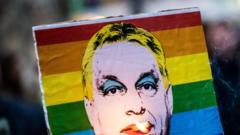Despite the Hungarian government's warnings of legal repercussions, the Budapest Pride march is set to proceed with hopes of a historic attendance. European leaders show support amid a tense atmosphere between activists and authorities.**
Budapest Pride March Set to Defy Government Crackdown Amidst Rising Tensions**

Budapest Pride March Set to Defy Government Crackdown Amidst Rising Tensions**
LGBTQ activists prepare for a record turnout at Hungary's Pride march, challenging Prime Minister Orban's legal threats and restrictive laws.**
In a bold act of defiance against government oppression, the Budapest Pride march is scheduled to take place this Saturday, amidst a backdrop of legal threats from Prime Minister Viktor Orban’s administration. The organizers of the event are anticipating a record number of participants, demonstrating resilience against growing pressure from nationalist politicians and law enforcement eager to deter pro-LGBTQ expressions.
This year marks a new challenge for the march, as Hungarian authorities have issued a ban on gatherings that they deem supportive of homosexuality. This is aligned with a controversial "child protection" law that critics have argued is merely a guise for advancing anti-LGBTQ sentiments. Prime Minister Orban, speaking on state radio, acknowledged the potential for police action against the event but attempted to downplay the risk of violence. "Of course, the police could break up such events... but it cannot reach the level of physical abuse," he stated, while also warning participants of possible fines up to €500 and the implementation of facial recognition technology for identifying attendees.
This year's Pride event has attracted attention from international figures, including EU equalities commissioner Hadja Lahbib, who is expected to participate and exemplified solidarity with the LGBTQ community by sharing a photo with Budapest's liberal mayor alongside a rainbow flag. Lahbib stressed that the Pride march would serve as a significant manifestation of civil strength and unity in the face of adversity.
In support of the march, European Commission President Ursula von der Leyen has urged the Orban government to allow the gathering to proceed without obstruction. However, Orban has dismissed calls for intervention, insisting that the EU should respect the sovereignty of member states regarding their law enforcement protocols.
As Budapest braces for the march, the LGBTQ community, alongside allies, aim to transform the event into a powerful statement of resilience in the face of legal threats and social stigma, reflecting ongoing struggles for equality and rights across Europe.





















